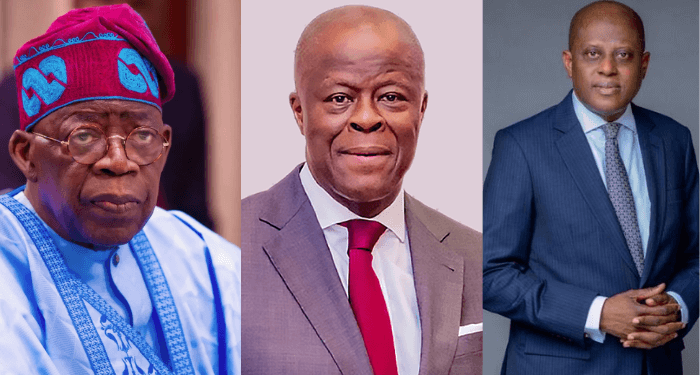*US Releases Own Thursday
*Okonjo-Iweala Laments Declining Well-being Of Nigerians, Says Growth Negative since 2014
The Nigerian and US economies will be in the spotlight this week as both countries release their second-quarter Gross Domestic Product (GDP) reports.
Nigeria’s Gross Domestic Product (GDP) has experienced a year-on-year growth of 3.19% in real terms during the second quarter of 2024.
This is according to the latest National Bureau of Statistics (NBS) data on Monday, August 26, 2024.
Alongside the Nigerian economy, that of the US will also be in the spotlight this week as the Bureau of Economic Analysis will release the country’s GDP for the second quarter of this year on Thursday, August 29.
Nigeria’s GDP growth rate surpasses the 2.51% recorded in the second quarter of 2023 and the 2.98% growth seen in the first quarter of 2024.
This is even as Nigerians are expressing growing frustration as prices of food items, cost of transportation and fuel queues continue to persist across multiple states, despite assurances from authorities.
Prices of major food items, according to metrobusinessnews.com (MBN), survey, are still very high and beyond the reach of ordinary Nigerians.
With a bag of rice still at N80, 000, beans, N160,000, the retail sales usually patronized by the lower cadre in the society are not better either.
In Abuja, although fuel queues have shortened in some areas, many filling stations remain closed, and prices still range between N700 and N800 per litre. In the outskirts, prices are even higher, reaching up to N950 per litre due to inconsistent fuel distribution.
In Lagos, the situation remains dire, with long queues at the few stations that have fuel. Prices in the city range from N720 to N960 per litre, with motorists and petroleum marketers expressing frustration over the ongoing crisis.
Elsewhere, in states like Port Harcourt, Edo, and Kano, fuel prices have skyrocketed, with some black market sellers charging up to N1,100 per litre. The scarcity has also led to increased transportation costs, adding to the hardship faced by Nigerians.
Consequently, cost of transportation has gone higher, compounding the challenges of the masses.
This is despite promises from the Nigerian National Petroleum Company Limited (NNPCL) to resolve the distribution challenges, the situation remains dire, leaving Nigerians struggling with the impact of the prolonged fuel crisis
Similarly, the Director General of the World Trade Organization (WTO), Ngozi Okonjo-Iweala has lamented that the country’s GDP) growth rate on average has been steadily declining since 2014, signalling a downturn in the economic well-being of the average Nigerian.
Okonjo-Iweala raised the concern while speaking at the annual General Conference of the Nigerian Bar Association (NBA) on Sunday.
According to her, the country’s economic fortunes experienced a reversal following the decade between 2000 and 2014, during which the average GDP growth rate was approximately 3.8%.
She said this consistent GDP growth outpaced the nation’s population growth, which was only around 2.6% annually.
However, she pointed out that since 2014, the situation has reversed, with GDP showing a negative growth rate of 0.9%, as the government has been unable to sustain the positive growth achieved by previous administrations.
Specifically, Nigeria’s Q2 2024, GDP performance was primarily driven by the Services sector, which grew by 3.79% and contributed 58.76% to the total GDP.
The Agriculture sector saw a growth of 1.41%, slightly down from the 1.50% growth recorded in Q2 2023.
The Industry sector improved significantly, with a growth of 3.53%, compared to the -1.94% decline observed in the second quarter of 2023.
Recently the NBS announced that Nigeria’s headline inflation rate decreased to 33.40% in July 2024, down from 34.19% in June 2024.
The decline was in line with the expectations of Financial analysts who projected that the country’s inflation would cool off from July to August.
Also, the US economic growth was much weaker than expected to start the year, and prices rose at a faster pace, the Commerce Department reported Thursday.
ALSO READ:Services Sector Responsible For Nigeria’s 3.46% Economic Growth In Q4 Of 2023, Says NBS
Gross domestic product, a broad measure of goods and services produced in the January-through-March period, increased at a 1.6 percent annualised pace when adjusted for seasonality and inflation, according to the department’s Bureau of Economic Analysis.
The report came with markets on edge about the state of monetary policy and when the Federal Reserve will start cutting its benchmark interest rate.
The federal funds rate, which sets what banks charge each other for overnight lending, is in a targeted range between 5.25 percent and 5.5 percent, the highest in some 23 years, though the central bank has not hiked since July 2023.
Investors are looking forward to next month when the Fed will start easing as inflation has remained elevated.
However, in July the US inflation, a broad-based measure of prices for goods and services, increased 0.2 percent for the month, putting the 12-month inflation rate at 2.9 percent, its lowest since March 2021, which is likely to keep an interest rate cut on the table in September.













